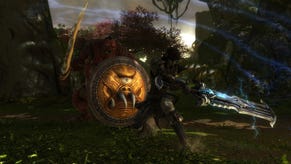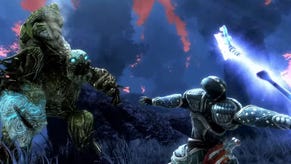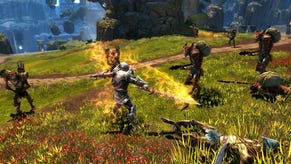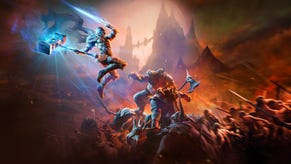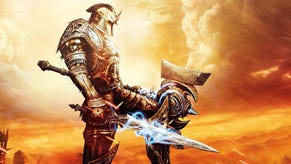How Kingdoms of Amalur aims to create a new genre
Kingdoms of Amalur: Reckoning is almost upon us, and early reports are highly favourable - but what exactly is this new IP? We get the skinny from lead designer Joe Quadara on a revolutionary RPG.
It's been years since I've played a game I couldn't instantly describe to another gamer by reference to another title. Battlefield is like Call of Duty, only it emphasises teamwork in multiplayer; Red Orchestra is like both, only as hard as titanium nails. Team Fortress? The same, but funny, and with hats.
I'm not judging; this is just how genres work, and there's plenty of scope for originality and innovation within them. But when a game comes along which steps outside those conventions, suddenly we're all a bit tongue-tied. Is Kingdoms of Amalur: Reckoning a real RPG, or is it an action game? Is it really possible to both when nobody has ever managed it before?
"I hate to use comparisons, because they imply so many things. Then once you combine everything, it really becomes its own thing," lead combat designer Joe Quadara told VG247.
"Furthermore, once I’ve spewed out all these games you know, there’s all the stuff that we’re doing that has never been done before."
Nevertheless, the designer spat one up.
"It’s action-combat like Bayonetta or God of War done with a Diablo-esque loot system," he conceded, but added:
"The world has no comparison that I can think of (despite many people comparing us to the Fable series, Reckoning is much larger and open). It is open and lovingly hand crafted with over 120 unique dungeons to explore and hundreds of hours of content. The written dialog could fill ten novels, and the voice acting is top notch.
"There is tons for the player to do, and truly role-play in a way that only a guy like [Morrowind and Oblivion designer] Ken Rolston can deliver."
One of the titles Quadara name-dropped makes my fingers itch. Bayonetta is one of those action games that just gets deeper the more you poke at it, and requires synaptic-fast reactions, precision timing, and the study of enemy move-sets to really master. In other words, about as far away from RPG combat as you can get without actually leaving the planet entirely - but don't worry, there's plenty of number-crunching for the min-max crowd.
"Kingdoms of Amalur: Reckoning is first and foremost an RPG. So numbers and stats are always more important than how good someone is with a timed button or key presses. And because we have such a loot-heavy system, you really pay attention to the stats and effects of your equipment," Quadara explained.
"The really cool thing about this game is that even if you are an RPG master, the skill portion of the game always gives you something to improve. And if you are coming into Reckoning as a callous-fingered fighting gamer like myself, you better prepare to do some math. Fast fingers will only get you so far."
Rather than choosing a class at the beginning and being locked into a particular stream of progression, Reckoning presents players with three core skill trees - Might, Finesse, and Sorcery - and allows them to pick freely from all of them at any time. While this frees the player from strict conventions and allows for customised builds, it also robs them of the class-specific bonuses common to RPGs -and it's here that the Destiny system comes into play, awarding the player with Destiny Cards based on their investments across the three trees. Although only one can be equipped at once, you can carry several, and swap them in and out depending on your preferred play-style, changing conditions, and unlocks.
"For example, at level 16, if you have invested all of your points in the Sorcery tree, you would be awarded the Sage Destiny Card," Quadara detailed.
"Equipping this Destiny would give you +40% to your elemental damage, a 17% reduction in mana cost, +1 mana regen per second, +15% duration on all DoTs, and Ice Blink (a teleport that applies an Ice DoT when passing through enemies)."
Interestingly, this system rewards approaches punished by other RPGs.
"The Destiny system really shines when you invest between the different trees. For instance, if you were level 16 and had split your investment evenly between the Might and Sorcery trees, you would unlock the Crusader Destiny Card," the designer continued.
"Equipping this Destiny would give you 40% of damaged received back as mana, +20% elemental resistance, +15% to all melee damage, and Blink – a teleport that replaces your normal dodge ability.
"In most RPGs, investing uniformly across all trees is a terrible idea. In Reckoning, it’s a completely valid choice and play style."
"The ability to make hybrid characters actually worthwhile in the later stages of the game is what makes the Destiny system so cool. In most RPGs, investing uniformly across all trees is a terrible idea. In Reckoning, it’s a completely valid choice and play style."
While re-specs are possible, the continual unlocking of new Destiny Cards mean they're largely unnecessary. So no more reaching level 40 and realising you'd made a choice around level 13 which completely ruins your planned build and leaves you with half a dozen useless abilities.
"The Destiny system itself does a great job at keeping people’s choices competitive. Also, all of the weapons cost nothing to use at the base level, so players are free to try out the weapon before they invest in it," Quadara added.
"Finally, the Moves UI shows anyone that’s curious how a particular active ability might work in combat. We believe this combination of the Destiny system and giving the player lots of information is incredibly liberating and encourages players to try out new stuff all the time."
So there you have it: a finger-crunching action game with a deep, stat-heavy progression system rewarding experimentation, and hundreds of hours of content. If we have to invent a new word for this genre, I think I'll vote for "awesome".
Kingdoms of Amalur: Reckoning releases on PC, PlayStation 3 and Xbox 360 this week. A demo is available.





